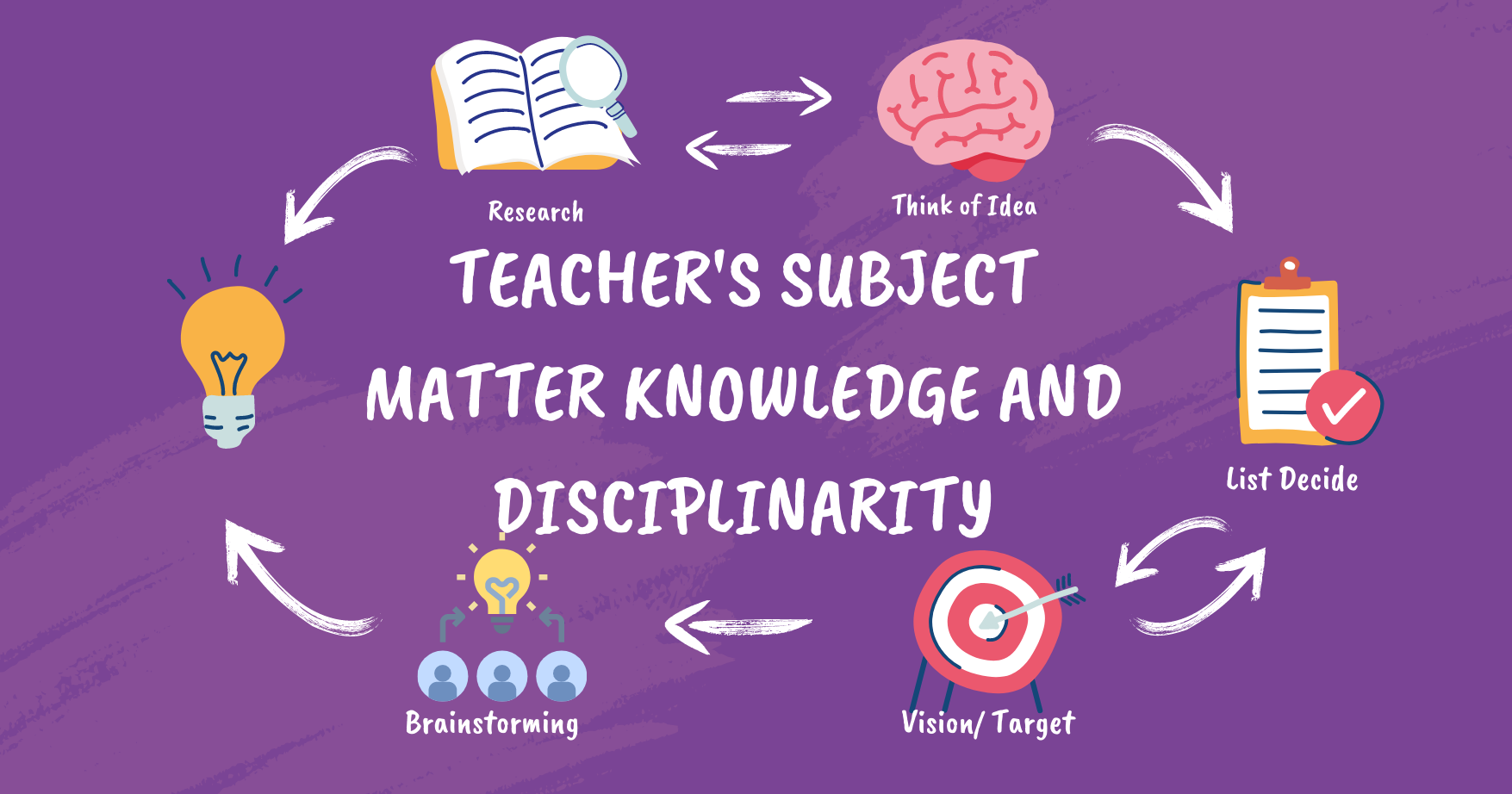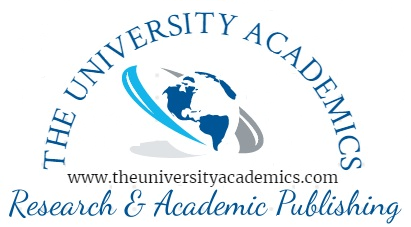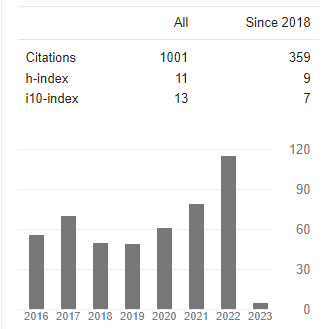Teachers Pedagodical And Subject Matter Competence For Effective Instructional Delivery Of Pre-Vocational Studies Curriculum In Upper Basic Education In South East Nigeria
Abstract
It is indisputable that teachers have an impact on how well school courses are taught. In a similar vein, teachers' ability to effectively teach subjects is crucial to students' academic success. This study evaluated the pedagogical and subject-matter proficiency of teachers in upper basic education in southeast Nigeria for the purpose of effectively delivering the pre-vocational studies curriculum. Two research questions and two related hypotheses were developed in order to accomplish the study's goal. The descriptive survey design was used in the investigation. In 1,305 upper basic schools across the five states of southeast Nigeria, there were 2,610 management staff members and 1,865 pre-vocational teachers who comprised the study's population. The stratified and simple random sampling method was used to select 232 managements and 332 prevocational subject teachers as the study's sample size. A reliability index of 0.91 was determined. Frequency counts and mean scores for the study questions were utilized to descriptively examine the data, and the t-test and ANOVA were employed to assess the hypotheses. According to a one-way ANOVA, the mean effects of teachers' subject matter expertise on the implementation of the pre-vocational studies curriculum in upper basic education across the five states of southeast Nigeria were statistically negligible. An action plan should be implemented by the government and management to increase teachers' proficiency in using contemporary pedagogy for the successful implementation of pre-vocational curricula. To support teachers' professional development and efficacy in teaching pre-vocational studies, it is important to encourage ongoing supervision of instruction.
Downloads
References
Amie-Ogan, T. O. & Omunakwe, F. B. (2020). Perceived influence of teachers‟ quality on students‟ academic performance in public senior secondary schools in Port Harcourt Metropolis of Rivers State, Nigeria. International Journal of Innovative Social & Science Education Research 8(3): 146-161
Amusan, M. A. (2016). Cultivating effective pedagogical skills in in-service teachers: the role of some teacher variables. JISTE, 20(1), 83-89.
Anselmus, S. (2011). Teachers’ competency and students’ performance. Timor East Musa Tenggara Province: Timor University Press.
Akram, M. (2012). Formal education, skill development and vocationalization: The missing link. Research on humanities and social sciences, 2 (8), 142-148.
Atsumbe, B. N., Raymond, E. & Mele, E. F. (2012). Retraining needs of technical educators for the implementation of the junior secondary school basic technology programme in Nigeria, 1 (4), 7-13
Ayub, H. (2017). Parental influence and attitude of students towards technical education and vocational training. International Journal of Information and Education Technology. 7(7).
Aziz, F., & Akhtar, M. M. S. (2014). Impact of training on teachers’ competencies at higher education level in Pakistan. Journal of Arts, Science & Commerce, 5(1).
Cubukcu, F. (2010). Student teachers' perceptions of teacher competence and their attributes for success and failure in learning. The Journal of International Social Research, 3(10).
Ebiringa, A. (2012). Perception of accounting teachers for the implementation of. social studies curriculum. Department of education university of Nigeria Nsukka. Unpublished memography.
Eche, N. P. & Nwankwo, I.N. (2011). Technical and vocational education: Road to sustainable development and poverty reduction in Nigeria. Journal of School of Vocational Education (JOVED), 1(1), 86-94.
Ede, M. N. (2014). The fifth discipline and teachers’ competence. International Journal for Innovation Education and Research, 2(10).
Eneh, O.N. (2010) Artisanship Disconnect: Declining technical apprenticeship and artisan service and the implications for Nigeria’s future development. Asian Journal of Industrial Engineering 2, 37-51.
Fafunwa, B. A. (2003). Nigerian education: Yesteryears. Now and the Future. In Abayomi & D. Atilade (Eds.), State of education in Nigeria:
Fafuwa, A.B. (2000). Teachers’ education in Nigeria, West African Journal of Education,14(1).
Federal Republic of Nigeria, (2012). Senior secondary school curriculum business studies: Abuja, NERDC Press
James, H. K. (2017). “Teacher competencies in Implementation of curriculum for learners with special needs in Kenyan Schools.” IOSR Journal of Research & Method in Education (IOSR-JRME), 7(4), 62–66.
Hakim A. (2015). Contribution of competence teacher (pedagogical, personality, professional competence and social) on performance of learning. International Journal of Engineering and Sciences, 4(2), 1-12.
Lent. R. W., Brown. S.D., & Hackett, A. (1994). Contextual supports and barriers to career choice: A Social Cognitive Analysis. Journal of Counseling Psychology. 48, 36-49. Dui. 10. 1037//0022-0167.1.36.
Liakopoulou, M. (2011). The Professional competence of teachers: Which qualities, attitudes, skills and knowledge contribute to a teacher’s effectiveness? Researcher Aristotle University of Thessaloniki Makedonomaxon 53, Halastra Thessaloniki, 57 300 GREECE.
MDG (2012). MDG Vision Statement. www.undp.org/mdgoverview on 25/04/14.
Merriam, A. R. (2015). Fundamentals of Basic Technology education in Nigeria. Britain: The Falmer Publishers.
Miller, I.O., Bakare, J.A., & Ikatule, R. O. (2010). Professional capacity building needs of teachers for effective teaching of Basic Technology curriculum to students in junior secondary schools in Lagos State.
Mustafa, M. N. (2013). Professional competence differences among high school teachers in Indonesia. International Education Studies, 6(9). https://doi.org/10.5539/ies.v6n9p83
Obomanu, B. J. (2015). Development of technical and vocational education and training (TVET) in Nigeria: The journey so far. A Keynote Address delivered at the 12th Annual National Conference of Historians of Education Development Society of Nigeria (HOEDSON) held at the University of Port Harcourt, Port Harcourt.
Ololube, N. P. (2013). Educational management, planning and supervision: model for effective implementation. Owerri, Nigeria: Spring Field Publishers.
Onsare, P. O. (2014). The pedagogical hindrances to oral communication skills in English in Kenya: a case of secondary schools in Kisii County. Educational Research, 4(7) 536-542. http://www.interesjournals.org/ER.
Oviawe, J.I., Ezeji, S.C.O.A., & Uwameiye, R. (2015). Comparative effectiveness of three methods on the academic performance of students in building technology in Nigerian polytechnics. European Scientific Journal, 11 (12), 274 – 285. www.eujournal.org/index.php/esj/article/view/5481
Ranija, R. Z. (2016). The structure of primary school teachers’ professional competence. International Journal of Environmental & Science Education, 11(6), 1167-1173.
Stavreva, S.V. (2013). The effects of usage of sequential teaching method on the academic achievement and retention level of learners in area of Biological Sciences or Biochemistry. International Valorisation Conference “Key Methodology to Successful Competence Based Learning”.
UNESCO-UNEVOC (2012) Participation in formal technical and vocational education and training (TVET).
UNESCO (2020). School and teaching practices for the twenty-first century challenges: Lessons from the Asia-Pacific Region. Pairs, France.

Copyright (c) 2025 Rachael Onwadi, Susan Obasi

This work is licensed under a Creative Commons Attribution 4.0 International License.














